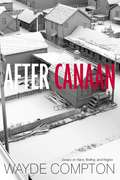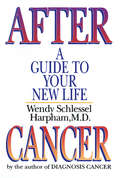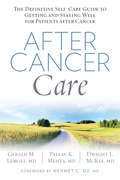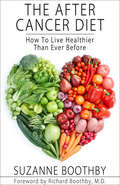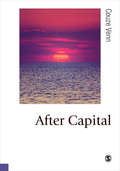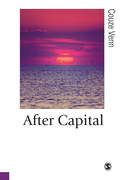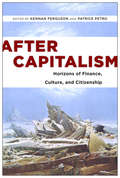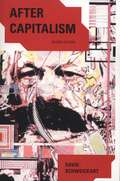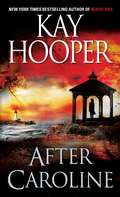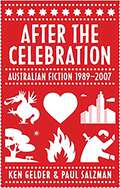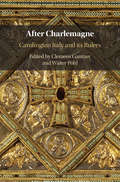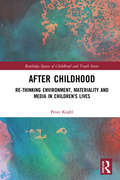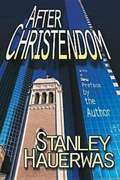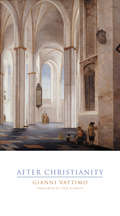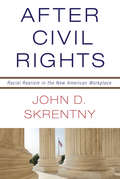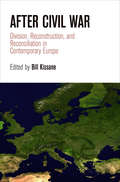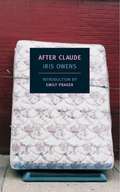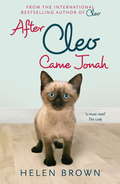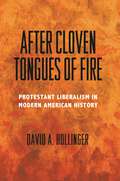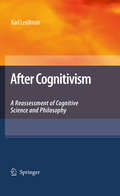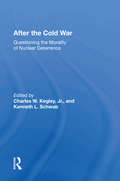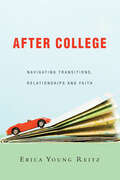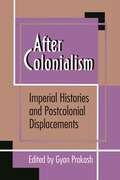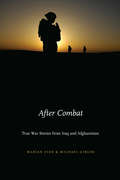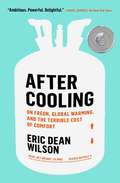- Table View
- List View
After Canaan
by Wayde Compton"Compton pushes us to look beneath the surface--past those comforting tales of nationhood and racial solidarity--to the more nebulous and ever-shifting truth. This is a brilliant and original work that should be mandatory reading for any student of race and history."--Danzy Senna, author of Caucasia After Canaan, the first nonfiction book by acclaimed African Canadian poet Wayde Compton, repositions the North American discussion of race in the wake of the tumultuous twentieth century. Written from the perspective of someone who was born and lives outside of African American culture, it riffs on the concept of Canada as a promised land (or "Canaan") encoded in African American myth and song since the days of slavery. These varied essays, steeped in a kind of history rarely written about, explore the language of racial misrecognition (also known as "passing"), the failure of urban renewal, humor as a counterweight to "official" multiculturalism, the poetics of hip hop turntablism, and the impact of the Obama phenomenon on the way we speak about race itself. Compton marks the passing of old modes of antiracism and multiculturalism, and points toward what may or may not be a "post-racial" future, but will without doubt be a brave new world of cultural perception. After Canaan is a brilliant and thoughtful consideration of African (North) American culture as it attempts to redefine itself in the Obama era.
After Cancer: A Guide to Your New Life
by Wendy Schlessel HarphamHaving this book on my nightstand is like having an empathetic and wise friend at my side as I chart a new course after cancer treatment. Dr. Harpham blends practical information with the intimate understanding of a veteran. Her book serves as a companion and inspiration on my voyage. —Ellen Hermanson, editor, Networker (National Coalition for Cancer Survivorship Newsletter) This is the first book written by a doctor for the layperson that addresses the medicine, the practical issues, and the psychosocial elements of recovery after cancer treatment. The author a cancer survivor herself, understands that surviving cancer is more than just killing cancer cells and getting through treatment. Patients must deal with the emotional, social, spiritual, and financial fallout of a cancer diagnosis. By helping survivors understand that they can’t go back to where they were before cancer, she liberates them to move forward to a different, “new normal.” Writing in a reader-friendly, question-and-answer format, Dr. Wendy Harpham addresses a wide range of issues realistically yet hopefully. Among them are understanding the medicine of reevaluation, follow-up, and prevention treatment; dealing with the most common physical aftereffects of treatment; learning how to make decisions about work and school; relating to friends and family; helping children deal with parent’s cancer; and coping with the practicalities of living wills and insurance. An important section on post cancer fatigue will be of special interest to patients who find that exhaustion is one of the most difficult problems with which they deal.
After Cancer Care: The Definitive Self-Care Guide to Getting and Staying Well for Patients after Ca ncer
by Gerald Lemole Pallav Mehta Dwight Mckee Mehmet OzAfter the intense experience and range of emotion that comes with surgery, radiation, or chemotherapy (or all three), cancer patients often find themselves with little or no guidance when it comes to their health post-treatment. After Cancer Care is the much-needed authoritative, approachable guide that fills this gap. It includes information on how to maintain physical health—with chapters on epigenetics, nutrition, and exercise—as well as emotional health through stress management techniques.The cutting-edge and growingly popular science of Epigenetics has shown that you are not stuck with your genetic history: your choices in diet, exercise, and even relationships can help determine whether or not your genes promote cancer, and therefore determine your propensity for relapse. Your lifestyle has an effect on the most common types of cancer including breast cancer, prostate cancer, melanoma, endometrial cancer, colon cancer, bladder cancer, and lymphoma.The doctors present easy-to-incorporate lifestyle changes to help you “turn on” hundreds of genes that fight cancer, and “turn off” the ones that encourage cancer, while recommending lifestyle plans to address each type. In addition, they share 34 healthy recipes and tips on staying active and exercising, detoxifying your house and environment, and taking supplements to help prevent relapse.With more than three decades of post-cancer-care experience, Drs. Lemole, Mehta, and McKee break down the science into palatable, practical takeaways so that you can drastically improve your quality of life and enjoy many years of cancer-free serenity.
The After Cancer Diet: How To Live Healthier Than Ever Before
by Suzanne BoothbyThankfully for most people diagnosed with cancer today, the trend is survival. And the biggest tip for the more than 11 million cancer survivors in the United States to remain cancer free is to live a preventative lifestyle. This book is the go-to place for cancer thrivers who want to begin their journey to healthy living with easy recommendations from a cancer physician and a wellness writer.
After Capital (Published in association with Theory, Culture & Society)
by Couze VennThe present crisis of capitalism has a history. A history of the private accumulation of wealth through property regimes which allow increasing commodification and the privatisation of resources: from land to knowledge and even to life itself. Understanding that history may allow us to imagine alternatives after Capital which are no longer private but common. After Capital explores this history, showing how the economy is linked to environmental damage, climate change, resource depletion, and to massive inequality. It takes the reader from liberalism to neoliberalism, from climate change to the Anthropocene, and shows how this history is inextricably the history of colonialism. It is a rich and detailed narrative of capitalism over the last 200 years, that explains its texture and its neoliberal endgame. This discussion frames speculation on what postcapitalist societies could be, with regimes of private accumulation replaced by a politics and ethics of a democratic and ecologically- grounded Commons.
After Capital (Published in association with Theory, Culture & Society)
by Couze VennThe present crisis of capitalism has a history. A history of the private accumulation of wealth through property regimes which allow increasing commodification and the privatisation of resources: from land to knowledge and even to life itself. Understanding that history may allow us to imagine alternatives after Capital which are no longer private but common. After Capital explores this history, showing how the economy is linked to environmental damage, climate change, resource depletion, and to massive inequality. It takes the reader from liberalism to neoliberalism, from climate change to the Anthropocene, and shows how this history is inextricably the history of colonialism. It is a rich and detailed narrative of capitalism over the last 200 years, that explains its texture and its neoliberal endgame. This discussion frames speculation on what postcapitalist societies could be, with regimes of private accumulation replaced by a politics and ethics of a democratic and ecologically- grounded Commons.
After Capitalism: Horizons of Finance, Culture, and Citizenship
by Andrew Ross Bernard C. Perley Marcus Bullock Cristina Venegas Esther Leslie Kennan Ferguson Jeffrey Sommers Geoff Mann A. Aneesh Niki Akhavan Sherryl Vint Patrice Petro Ivan AscherFrom Thomas Piketty to David Harvey, scholars are increasingly questioning whether we are entering into a post-capitalist era. If so, does this new epoch signal the failure of capitalism and emergence of alternative systems? Or does it mark the ultimate triumph of capitalism as it evolves into an unstoppable entity that takes new forms as it engulfs its opposition? After Capitalism brings together leading scholars from across the academy to offer competing perspectives on capitalism's past incarnations, present conditions, and possible futures. Some contributors reassess classic theorizations of capitalism in light of recent trends, including real estate bubbles, debt relief protests, and the rise of a global creditocracy. Others examine Marx's writings, unemployment, hoarding, "capitalist realism," and coyote (trickster) capitalism, among many other topics. Media and design trends locate the key ideologies of the current economic moment, with authors considering everything from the austerity aesthetics of reality TV to the seductive smoothness of liquid crystal. Even as it draws momentous conclusions about global economic phenomena, After Capitalism also pays close attention to locales as varied as Cuba, India, and Latvia, examining the very different ways that economic conditions have affected the relationship between the state and its citizens. Collectively, these essays raise provocative questions about how we should imagine capitalism in the twenty-first century. Will capitalism, like all economic systems, come to an end, or does there exist in history or elsewhere a hidden world that is already post-capitalist, offering alternative possibilities for thought and action?
After Capitalism
by David SchweickartSince first published in 2002, After Capitalism has offered students and political activists alike a coherent vision of a viable and desirable alternative to capitalism. David Schweickart calls this system Economic Democracy, a successor-system to capitalism which preserves the efficiency strengths of a market economy while extending democracy to the workplace and to the structures of investment finance. In the second edition, Schweickart recognizes that increased globalization of companies has created greater than ever interdependent economies and the debate about the desirability of entrepreneurship is escalating. The new edition includes a new preface, completely updated data, reorganized chapters, and new sections on the economic instability of capitalism, the current economic crisis, and China. Drawing on both theoretical and empirical research, Schweickart shows how and why this model is efficient, dynamic, and applicable in the world today.
After Caroline: A Novel
by Kay HooperJoanna Flynn was lucky to be alive. Twice in a matter of minutes she almost died on a patch of oil-slicked highway. But when the doctors told her that she would suffer no lasting effects, they were wrong. For that night the dream began...It was only of a house perched high above the sea, of a ticking clock and the lingering scent of roses. Yet night after night it awoke Joanna with a sense of panic. Its terror lingered throughout her days, urging her to do something--but what?Then two strangers on the street called her Caroline, and Joanna knew she had to find an explanation for what was happening, or she'd lose her mind. What she finally uncovered was an obituary for a woman named Caroline McKenna--a woman who looked enough like her to be her twin, a woman who was killed in a car accident on the same day Joanna should have perished.Now her torturous nightmares and a tenuous connection have brought Joanna three thousand miles across country to the town where Caroline lived--and died. Almost everyone has stories to tell about Cliffside's leading lady, and yet no one seems to have known her. Was she the shy wife or the seductress of men? The devoted mother or the selfish beauty?Too soon Joanna realizes that it's not her sanity at stake, but her life. For unraveling the mystery of Caroline means uncovering the secrets in this picturesque town, secrets someone may have killed to hide. And that someone appears all too willing to kill again.From the Paperback edition.
After The Celebration: Australian Fiction 1989-2007
by Ken Gelder Paul SalzmanAfter the Celebration explores Australian fiction from 1989 to 2007, after Australia's bicentenary to the end of the Howard government. In this literary history, Ken Gelder and Paul Salzman combine close attention to Australian novels with a vivid depiction of their contexts: cultural, social, political, historical, national and transnational. From crime fiction to the postmodern colonial novel, from Australian grunge to 'rural apocalypse fiction', from the Asian diasporic novel to the action blockbuster, Gelder and Salzman show how Australian novelists such as Frank Moorhouse, Elizabeth Jolley, Peter Carey, Kim Scott, Steven Carroll, Kate Grenville, Tim Winton, Alexis Wright and many others have used their work to chart our position in the world. The literary controversies over history, identity, feminism and gatekeeping are read against the politics of the day. Provocative and compelling, After the Celebration captures the key themes and issues in Australian fiction: where we have been and what we have become.
After Charlemagne: Carolingian Italy and its Rulers
by Clemens Gantner Walter PohlAfter Charlemagne's death in 814, Italy was ruled by a succession of kings and emperors, all of whom could claim some relation to the Carolingians, some via the female line of succession. This study offers new perspectives on the fascinating but neglected period of Italy in the ninth century and the impact of Carolingian culture. Bringing together some of the foremost scholars on early medieval Italy, After Charlemagne offers the first comprehensive overview of the period, and also presents new research on Italian politics, culture, society and economy, from the death of Charlemagne to the assassination of Berengar I in 924. Revealing Italy as a multifaceted peninsula, the authors address the governance and expansion of Carolingian Italy, examining relations with the other Carolingian kingdoms, as well as those with the Italian South, the Papacy and the Byzantine Empire. Exploring topics on a regional and local level as well as presenting a 'big picture' of the Italian or Lombard kingdom, this volume provides new and exciting answers to the central question: How Carolingian was 'Carolingian Italy'?
After Childhood: Re-thinking Environment, Materiality and Media in Children's Lives (Routledge Spaces of Childhood and Youth Series)
by Peter KraftlThis book offers a new approach for theorising and undertaking childhood research. It combines insights from childhood and generational studies with object-oriented ontologies, new materialisms, critical race and gender theories to address a range of key, intractable challenges facing children and young people. Bringing together traditional social-scientific research methods with techniques from digital media studies, archaeology, environmental nanoscience and the visual arts, After Childhood: Re-thinking Environment, Materiality and Media in Children's Lives presents a way of doing childhood research that sees children move in and out of focus. In doing so, children and their experiences are not completely displaced; rather, new perspectives on concerns facing children around the world are unravelled which dominant approaches to childhood studies have not yet fully addressed. The book draws on the author’s detailed case studies from his research in historical and geographical contexts. Examples range from British children’s engagement with plastics, energy and other matter, to the positioning of diverse Brazilian young people in environmental and resource challenges, and from archaeological evidence about childhoods in the USA and Europe to the global circulation of children’s toys through digital media. The book will appeal to human geographers, sociologists, anthropologists, education studies scholars and others working in the interdisciplinary field of childhood studies, as well as to anyone looking for a range of novel, interdisciplinary frames for thinking about childhood.
After Christendom?: How the Church Is to Behave If Freedom, Justice, and a Christian Nation Are Bad Ideas
by Stanley HauerwasLiberal/conservative and modern/postmodern concepts define contemporary theological debate. Yet what if these categories are grounded in a set of assumptions about what it means to be the church in the world, presuming we must live as though God's existence does not matter? What if our theological discussion distracts us from the fact that the church is no longer able to shape the desires and habits of Christians? Hauerwas wrestles with these and similar questions constructing a theological politics necessary for the church to be the church in the world. In so doing, he challenges liberal notions of justice and freedom.
After Christianity (Italian Academy Lectures)
by Gianni VattimoWhat has been the fate of Christianity since Nietzsche's famous announcement of the "death of God"? What is the possibility of religion, specifically Christianity, thriving in our postmodern era? <P><P>In this provocative new book, Gianni Vattimo, leading Italian philosopher, politician, and framer of the European constitution, addresses these critical questions. When Vattimo was asked by a former teacher if he still believed in God, his reply was, "Well, I believe that I believe." This paradoxical declaration of faith serves as the foundation for a brilliant exposition on Christianity in the new millennium—an age characterized by a deep uncertainty of opinion—and a personal account of how Vattimo himself recovered his faith through Nietzsche and Heidegger. He first argues that secularization is in fact the fulfillment of the central Christian message, and prepares us for a new mode of Christianity. He then explains that Nietzsche's thesis concerns only the "moral god" and leaves room for the emergence of "new gods." Third, Vattimo claims that the postmodern condition of fragmentation, anti-Eurocentrism, and postcolonialism can be usefully understood in light of Joachim of Fiore's thesis concerning the "Spiritual Age" of history. Finally, Vattimo argues for the idea of "weak thought." Because philosophy in the postmetaphysical age can only acknowledge that "all is interpretation," that the "real" is always relative and not the hard and fast "truth" we once thought it to be, contemporary thought must recognize itself and its claims as "weak" as opposed to "strong" foundationalist claims of the metaphysical past. Vattimo concludes that these factors make it possible for religion and God to become a serious topic for philosophy again, and that philosophy should now formally engage religion.
After Civil Rights: Racial Realism in the New American Workplace
by John D. SkrentnyA provocative new approach to race in the workplaceWhat role should racial difference play in the American workplace? As a nation, we rely on civil rights law to address this question, and the monumental Civil Rights Act of 1964 seemingly answered it: race must not be a factor in workplace decisions. In After Civil Rights, John Skrentny contends that after decades of mass immigration, many employers, Democratic and Republican political leaders, and advocates have adopted a new strategy to manage race and work. Race is now relevant not only in negative cases of discrimination, but in more positive ways as well. In today's workplace, employers routinely practice "racial realism," where they view race as real—as a job qualification. Many believe employee racial differences, and sometimes immigrant status, correspond to unique abilities or evoke desirable reactions from clients or citizens. They also see racial diversity as a way to increase workplace dynamism. The problem is that when employers see race as useful for organizational effectiveness, they are often in violation of civil rights law.After Civil Rights examines this emerging strategy in a wide range of employment situations, including the low-skilled sector, professional and white-collar jobs, and entertainment and media. In this important book, Skrentny urges us to acknowledge the racial realism already occurring, and lays out a series of reforms that, if enacted, would bring the law and lived experience more in line, yet still remain respectful of the need to protect the civil rights of all workers.
After Civil War: Division, Reconstruction, and Reconciliation in Contemporary Europe (National and Ethnic Conflict in the 21st Century)
by Bill KissaneCivil war inevitably causes shifts in state boundaries, demographics, systems of rule, and the bases of legitimate authority—many of the markers of national identity. Yet a shared sense of nationhood is as important to political reconciliation as the reconstruction of state institutions and economic security. After Civil War compares reconstruction projects in Bosnia, Cyprus, Finland, Greece, Kosovo, Northern Ireland, the Republic of Ireland, Spain, and Turkey in order to explore how former combatants and their supporters learn to coexist as one nation in the aftermath of ethnopolitical or ideological violence.After Civil War synthesizes research on civil wars, reconstruction, and nationalism to show how national identity is reconstructed over time in different cultural and socioeconomic contexts, in strong nation-states as well as those with a high level of international intervention. Chapters written by anthropologists, historians, political scientists, and sociologists examine the relationships between reconstruction and reconciliation, the development of new party systems after war, and how globalization affects the processes of peacebuilding. After Civil War thus provides a comprehensive, comparative perspective to a wide span of recent political history, showing postconflict articulations of national identity can emerge in the long run within conducive institutional contexts.Contributors: Risto Alapuro, Vesna Bojicic-Dzelilovic, Chares Demetriou, James Hughes, Joost Jongerden, Bill Kissane, Denisa Kostovicova, Michael Richards, Ruth Seifert, Riki van Boeschoten.
After Claude
by Iris OwensHarriet has left her boyfriend Claude, the French rat. At least that is how she prefers to frame the matter. In fact, after yet one more argument, Claude has just instructed Harriet to move out of his Greenwich Village apartment not that she has any intention of doing so. To the contrary, she will stay and exact her vengeance or such is her intention until Claude has her unceremoniously evicted. Still, though moved out, Harriet is not about to move on. Not in any way. Girlfriends circle around to give advice, but Harriet only takes offense, and you can understand why. Because mad and maddening as she may be, Harriet sees past the polite platitudes that everyone else is content to spout and live by. She is an unblinkered, unbuttoned, unrelenting, and above all bitingly funny prophetess of all that is wrong with women's lives and hearts until, in a surprise twist, she finds a savior in a dark room at the Chelsea Hotel.
After Cleo, Came Jonah
by Helen BrownJonah entered Helen Brown's life not long after she was diagnosed with breast cancer and had begun recovery from a mastectomy. His arrival coincided with the finalisation of her previous book, Cleo, as well as preparations for the wedding of her son and struggles with her daughter's determination to embark on a spiritual journey. Jonah, as it happened, was just as headstrong as Helen's daughter. So while Helen attempted to deal with her own mortality and help arrange a wedding, her daughter took off to war-torn Sri Lanka and Jonah fled down the street.In Cats and Daughters, Helen Brown writes with honesty and humour about family life, its serious setbacks and life-changing events. She also learns that sometimes the best thing a strong mother and cat slave can do is step back, have faith in those she loves and be grateful nothing's perfect. As Helen writes in her dedication, this book is 'to cats and daughters who don't always come when called'.
After Cloven Tongues of Fire: Protestant Liberalism in Modern American History
by David A. HollingerThe important role of liberal ecumenical Protestantism in American historyThe role of liberalized, ecumenical Protestantism in American history has too often been obscured by the more flamboyant and orthodox versions of the faith that oppose evolution, embrace narrow conceptions of family values, and continue to insist that the United States should be understood as a Christian nation. In this book, one of our preeminent scholars of American intellectual history examines how liberal Protestant thinkers struggled to embrace modernity, even at the cost of yielding much of the symbolic capital of Christianity to more conservative, evangelical communities of faith.If religion is not simply a private concern, but a potential basis for public policy and a national culture, does this mean that religious ideas can be subject to the same kind of robust public debate normally given to ideas about race, gender, and the economy? Or is there something special about religious ideas that invites a suspension of critical discussion? These essays, collected here for the first time, demonstrate that the critical discussion of religious ideas has been central to the process by which Protestantism has been liberalized throughout the history of the United States, and shed light on the complex relationship between religion and politics in contemporary American life.After Cloven Tongues of Fire brings together in one volume David Hollinger's most influential writings on ecumenical Protestantism. The book features an informative general introduction as well as concise introductions to each essay.
After Cognitivism: A Reassessment of Cognitive Science and Philosophy
by Karl LeidlmairThis book comprises a collection of papers dealing with the reassessment of thinking in Cognitive Science and in Philosophy today. Still dependent on basic assumptions of Cartesian philosophy, Cognitive Science took over the mistakes of classical computational models. Instead of being treated as mere or pure explanations of mental processes with hindsight, these models were mistakenly used as more or less literal causal descriptions of the (working of the) mind. A clear insight into the relevance of embodied and embedded knowledge is not only a central topic in AI research; it can become a driving force for a reassessment of philosophy. Philosophy, which is struggling with the two opposite alternatives of cultural relativism and rationalism, both of which have turned out to be dead ends, is in need of a reassessment of reasoning. What is needed is a reasoning without reference to ultimate reasons which at the same time is grounded (and doesn't fall into the trap of cultural relativism).
After The Cold War: Questioning The Morality Of Nuclear Deterrence
by Charles KegleyThis is a text on the traditional questions of nuclear deterrence and the unconventional answers suggested by the emerging new world order. These widely-ranging essays by scholars, policymakers and moral philosophers present rival ideas about the morality of alternative means for preserving mutual security as the world moves beyond the Cold War.
After College: Navigating Transitions, Relationships and Faith
by Erica Young Reitz"The first year out was one of the hardest years of my life." —Curt
After Colonialism: Imperial Histories and Postcolonial Displacements (Princeton Studies in Culture/Power/History)
by Gyan PrakashAfter Colonialism offers a fresh look at the history of colonialism and the changes in knowledge, disciplines, and identities produced by the imperial experience. Ranging across disciplines--from history to anthropology to literary studies--and across regions--from India to Palestine to Latin America to Europe--the essays in this volume reexamine colonialism and its aftermath. Leading literary scholars, historians, and anthropologists engage with recent theories and perspectives in their specific studies, showing the centrality of colonialism in the making of the modern world and offering postcolonial reflections on the effects and experience of empire. The contributions cross historical analysis of texts with textual examination of historical records and situate metropolitan cultural practices in engagements with non-metropolitan locations. Interdisciplinarity here means exploring and realigning disciplinary boundaries. Contributors to After Colonialism include Edward Said, Steven Feierman, Joan Dayan, Ruth Phillips, Anthony Pagden, Leonard Blussé, Gauri Viswanathan, Zachary Lockman, Jorge Klor de Alva, Irene Silverblatt, Emily Apter, and Homi Bhabha.
After Combat: True War Stories from Iraq and Afghanistan
by Marian Eide Michael GiblerApproximately 2.5 million men and women have deployed to Iraq and Afghanistan in the service of the U.S. War on Terror. Marian Eide and Michael Gibler have collected and compiled personal combat accounts from some of these war veterans. In modern warfare no deployment meets the expectations laid down by stories of Appomattox, Ypres, Iwo Jima, or Tet. Stuck behind a desk or the wheel of a truck, many of today’s veterans feel they haven’t even been to war though they may have listened to mortars in the night or dodged improvised explosive devices during the day. When a drone is needed to verify a target’s death or bullets are sprayed like grass seed, military offensives can lack the immediacy that comes with direct contact.After Combat bridges the gap between sensationalized media and reality by telling war’s unvarnished stories. Participating soldiers, sailors, marines, and air force personnel (retired, on leave, or at the beginning of military careers) describe combat in the ways they believe it should be understood. In this collection of interviews, veterans speak anonymously with pride about their own strengths and accomplishments, with gratitude for friendships and adventures, and also with shame, regret, and grief, while braving controversy, misunderstanding, and sanction. In the accounts of these veterans, Eide and Gibler seek to present what Vietnam veteran and writer Tim O’Brien calls a “true war story”—one without obvious purpose or moral imputation and independent of civilian logic, propaganda goals, and even peacetime convention.
After Cooling: On Freon, Global Warming, and the Terrible Cost of Comfort
by Eric Dean WilsonThis dazzlingly original work of literary nonfiction interweaves the science and history of the powerful refrigerant (and dangerous greenhouse gas) Freon with a haunting meditation on how to live meaningfully and morally in a rapidly heating world.In After Cooling, Eric Dean Wilson braids together air-conditioning history, climate science, road trips, and philosophy to tell the story of the birth, life, and afterlife of Freon, the refrigerant that ripped a hole larger than the continental United States in the ozone layer. As he traces the refrigerant&’s life span from its invention in the 1920s—when it was hailed as a miracle of scientific progress—to efforts in the 1980s to ban the chemical (and the resulting political backlash), Wilson finds himself on a journey through the American heartland, trailing a man who buys up old tanks of Freon stockpiled in attics and basements to destroy what remains of the chemical before it can do further harm. Wilson is at heart an essayist, looking far and wide to tease out what particular forces in American culture—in capitalism, in systemic racism, in our values—combined to lead us into the Freon crisis and then out. It&’s a story that offers a rare glimpse of environmental hope, suggesting that maybe the vast and terrifying problem of global warming is not beyond our grasp to face.
